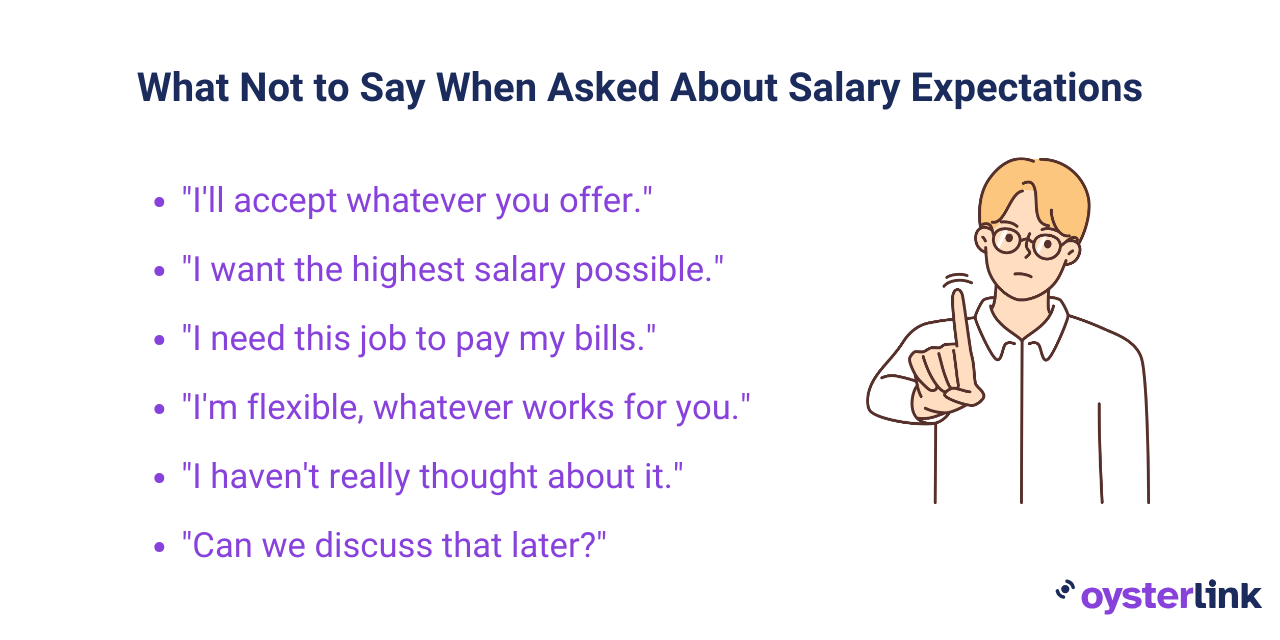You’re in the hot seat. The interviewer leans in and asks the question we all dread: “What are your salary expectations?” It’s a tricky one—you don’t want to aim too high and scare them off, but going too low could undervalue your worth.
Don’t sweat it. In this guide, we’ll show you exactly how to answer this question with confidence, tact, and strategy, so you walk away closer to the offer you deserve.
Why Do Companies Ask: “What Are Your Salary Expectations?”
From budget considerations to negotiation dynamics, the question about your salary expectations paves the way to a transparent and constructive dialogue in the hiring process.
Some of the reasons why companies might ask you this question include:
- Budget alignment: Companies have predefined budgets for each role, and asking about salary expectations helps them identify if you fall within that range.
- Hiring process efficiency: Knowing your salary expectations early in the process allows companies to focus on candidates who are likely to accept their job offer. It results in time savings for both you and the employer.
- Candidate commitment: Companies want to understand your interest in the position and your commitment to the opportunity.
- Negotiation preparation: Knowing your salary expectations helps companies assess whether there is flexibility in their budget or if negotiations may be required.
Understanding the Employer's Perspective on Salary Discussions
Gaining insight into the employer's viewpoint during salary discussions can enhance your negotiation strategy:
- Budget constraints: Employers operate within budgetary limits for each role. Understanding this can help you align your expectations accordingly.
- Equity among employees: Companies strive to maintain fair compensation across similar positions to ensure internal equity. Being aware of this can guide your salary discussions.
- Assessment of candidate's value: Employers evaluate how a candidate's skills and experience align with the compensation offered. Clearly articulating your value can positively influence this assessment.
14 Tips for Answering "What Are Your Salary Expectations?"
Mastering the art of discussing salary expectations before or during a job interview involves a strategic blend of research-backed figures, thoughtful negotiation, and a clear alignment between your professional value and expected compensation.
1. Search Online for Salary Ranges in Your Field and Location
Research salary ranges for positions similar to the one you're applying for in your specific geographic location. Consider factors like experience level, industry demand and regional cost of living.
To do that, use online resources, such as OysterLink’s salary database, wage surveys industry reports.
This research will make sure your salary expectations are realistic and in line with the market standards.
2. Offer a Salary Range
Instead of providing a fixed number, present a well-researched salary range based on your industry knowledge and the specific demands for the position.
As the lower end of the range, mention the minimum you find acceptable, considering your financial needs and industry standards. For the higher end, use an aspirational but still reasonable figure.
Offering a salary range shows your awareness of market conditions and your desire to be flexible, as well as opens the door for future negotiations.

3. Try to Avoid Answering on Paper
Whenever possible, avoid providing specific salary expectations on written documents. Instead, express your interest in discussing your compensation in person or during an interview.
This will help you tailor your response based on a more comprehensive understanding of the job requirements, company culture and the overall compensation package.
If you are requested to fill in your salary expectations in the application form, do not provide a specific figure. Offer a broad range or state your preference for discussing compensation during an interview.

4. Deflect the Question
Also, sometimes, the best way to answer the salary expectations question is to avoid answering it directly - at least at first. Deflecting the question can buy you time to learn more about the role and the company’s budget.
For example, you might say, "I’d love to learn more about the responsibilities and expectations of the role before discussing salary. Could you share more details about the position?" This approach shows that you’re focused on the job itself, not just the paycheck, and it gives you a chance to tailor your response once you have more information.

5. Consider What Budget You Need to Live & Maintain Your Lifestyle
Assess your personal financial needs, including living expenses, savings and spending. Consider housing costs, transportation and healthcare. This information will help you determine the minimum salary you need to maintain your lifestyle.
Additionally, think of your long-term financial goals, such as saving for a home or retirement.
6. Discuss Total Compensation
Ask about the entire compensation package offered by the company, including benefits, bonuses, stock options and other perks.
This information will help you assess the full value of the job while providing a more nuanced response to the salary question.

7. Talk to People in Similar Roles or Industries
Attend industry events, join professional networking groups or use platforms like LinkedIn to connect with people in your field.
When engaging in conversations about salary, collect information about the factors that influence compensation in the industry, such as experience level, skills and location.
Ask diplomatically for general insights into industry payment norms rather than specific figures.
9. Ask Them to Provide the Answer
After you've expressed your interest in the role and the company, ask your potential employer about their salary range for the position.
This tactic can help you check if the employer's range aligns with your expectations before committing to a specific figure and set the stage for a more collaborative and transparent negotiation process.

10. Know the Right Time You Encounter Salary Expectation Questions
Be mindful of the appropriate timing for discussing salary expectations. The early stages of the hiring process, which include application forms and initial interviews, typically focus on the company's needs and your qualifications. Steer the conversation toward your skills and experiences without delving into specific numbers.
At a later stage, during interviews or job offer discussions, discuss your expectations openly, backed up by research on industry earnings.
11. Compare the Salary in Your Current/Previous Job With the New Salary you Want
Assess the value of your current or previous total compensation package, including base salary, bonuses and benefits.
Evaluate your professional growth and achievements in your current/previous role to determine the value you bring to the table. Identify any gaps between your current compensation and the industry standards.
Use this information to justify your desired salary when discussing your salary expectations for the new role. Explain how your skills, experience and achievements justify the proposed figure.
12. Quantify Your Achievements
Use specific metrics and data to quantify your past achievements and demonstrate the impact of your work. This will both strengthen your case for a higher salary and provide a basis for the employer to understand your value proposition.
For example, you can say, "In my previous role, I suggested a client engagement strategy that contributed to a 15% growth in revenue over the course of the year. This achievement shows my ability to deliver tangible results, and I am confident that my skills will similarly contribute to the success of your team and company."
13. Practice Active Listening
Pay attention to the employer's responses and cues. If they express concerns or constraints, consider how you can address those points in a constructive manner to reach a mutually agreeable solution.
14. Be Mindful of Your Tone and Body Language
Maintain a confident yet friendly and approachable demeanor. Avoid appearing defensive or overly aggressive. Effective communication includes both verbal and non-verbal cues.
Common Mistakes To Avoid When Discussing Salary Expectations
When discussing salary expectations, it's crucial to avoid certain pitfalls that can negatively impact your candidacy:
- Providing your current salary information: Sharing your current salary can anchor the negotiation and limit your potential offer. Instead, focus on the value you bring to the new role.
- Being inflexible or arrogant: Approach salary discussions with openness and humility. Demonstrating flexibility can lead to more favorable outcomes.
- Discussing salary too early: Bringing up compensation prematurely can signal that you're more interested in the pay than the position. Wait for the appropriate stage in the interview process.
What Not to Say When Asked About Salary Expectations
Knowing what to say when discussing salary expectations is important. Equally vital is to be mindful of what to avoid saying, and why.
Here are some examples of what not to say:
"I'll accept whatever you offer."
This response suggests you have not done a preliminary research and are not in a strong negotiating position. Instead, convey that you have a clear understanding of your value and industry standards.
"I want the highest salary possible."
While it's natural to seek competitive compensation, stating an extreme preference might make you appear inflexible or solely motivated by money. Instead, express a willingness to discuss a fair and reasonable package.
"I need this job to pay my bills."
Personal financial needs are important, but such a statement can make you appear desperate. Instead, focus on your skill and experience and the value you bring to the role.
"I'm flexible, whatever works for you."
While flexibility is essential, this response can show you as indecisive. Instead, provide a well-researched salary range that aligns with industry standards and your value.
"I haven't really thought about it."
Lack of preparation can signal you are not interested enough in the position. Always research potential employers in advance and have a reasonable salary expectation ready to discuss.
"Can we discuss that later?"
Timing is crucial, but outright deflection might raise concerns. Instead, express your interest in discussing compensation once you know more about the position and the responsibilities it entails.

Cultural Differences in Salary Negotiations
Salary expectations and negotiation practices can vary widely across different cultures and regions. Understanding these cultural nuances is critical for international job seekers or those applying to companies with a global presence. Here’s how cultural differences play a role in salary discussions:
- Direct vs. indirect communication: Salary negotiations can vary widely depending on cultural norms. In the U.S., for example, it’s common to discuss salary expectations openly and even negotiate aggressively. However, in countries like Japan or South Korea, such discussions might be seen as too forward. Understanding these cultural nuances is especially important if you’re applying for a role in a different country or with a global company. Research local customs and, when in doubt, err on the side of caution.
- Negotiation norms: In certain countries, negotiating salary is seen as an essential part of the hiring process, and employers expect candidates to push for a better offer. In contrast, in some European or Scandinavian countries, salary negotiations are less common or may not be as expected, with employers offering what they consider a fair and fixed amount based on the position and company pay scales. It’s important to do research on the country’s hiring and compensation norms to ensure your approach is culturally appropriate.
- Collectivism vs. individualism: In more collectivist cultures, the concept of salary may be viewed in the context of fairness and equality among coworkers. Negotiations might be less personalized and more focused on ensuring everyone is compensated similarly. On the other hand, in individualistic cultures, there is often a greater emphasis on personal achievement and salary negotiations might be more individualized, with room for candidates to negotiate based on their unique qualifications.
- Benefits and Perks: In some cultures, the total compensation package (including benefits like healthcare, transportation, housing allowances and paid time off) plays a more significant role in salary discussions than the base salary itself. For example, expatriate packages often include various allowances and benefits that offset a lower salary offer, especially in regions where the cost of living might be higher or there are specific legal requirements for employee benefits.
By understanding the cultural context of salary expectations and negotiations, you can approach salary discussions with greater sensitivity and avoid potential missteps. Researching the norms of the country or company you're applying to and being aware of local practices will help you navigate the conversation more effectively and ensure a smoother negotiation process.
How To Handle a Low Offer
Receiving a salary offer lower than your expectations can be a difficult situation, but it’s important to handle it professionally and thoughtfully. Here’s how you can approach it:
- Evaluate the full compensation package: Before responding to a low offer, take time to review the entire compensation package. Sometimes, the salary may be lower than expected, but other benefits such as bonuses, health insurance, retirement contributions or flexible working arrangements can add significant value. Factor in all of these components before making a decision.
- Ask for clarification: If the offer feels low, don’t be afraid to ask for clarification on the salary structure. You can inquire if there is room for growth or if there are performance-based incentives or annual raises. Understanding the path to salary increases can help you gauge whether the offer can improve over time.
- Negotiate professionally: If you believe your skills, experience and the job responsibilities justify a higher salary, you can initiate a polite negotiation. Present your case with clear, concise reasons why you feel you deserve a higher amount, such as your relevant experience, market data or skills that align with the company’s needs. Avoid presenting an ultimatum and try to maintain a tone of collaboration to keep the conversation positive.
- Be prepared to make a decision: If after negotiations, the employer is unable to meet your salary expectations, you’ll need to assess whether the role and its other benefits outweigh the salary offer. Sometimes, a position with growth potential and other perks might be worth accepting despite a lower starting salary. However, don’t be afraid to walk away if the compensation doesn’t meet your needs or if you feel undervalued.
Conclusion
Answering 'What are your salary expectations?' doesn’t have to be a stressful experience. With the right preparation, research, and mindset, you can turn this question into an opportunity to showcase your value and negotiate a fair offer.
Remember to focus on the big picture - your skills, experience, and the unique contributions you’ll bring to the role. By following the tips in this guide, you’ll be ready to handle salary discussions with confidence and professionalism.











Loading comments...